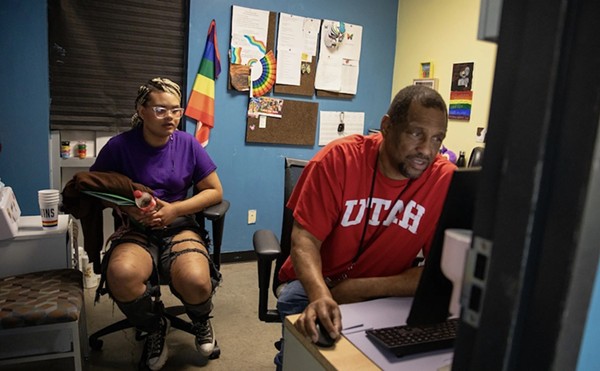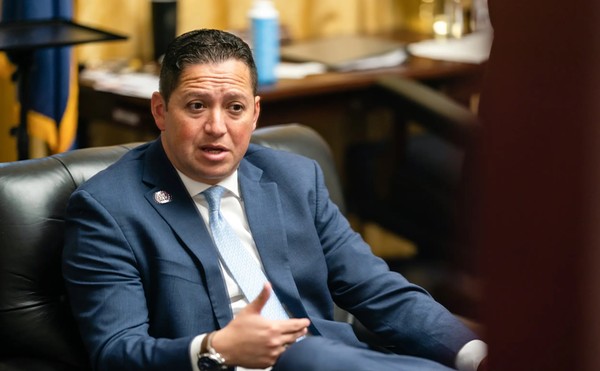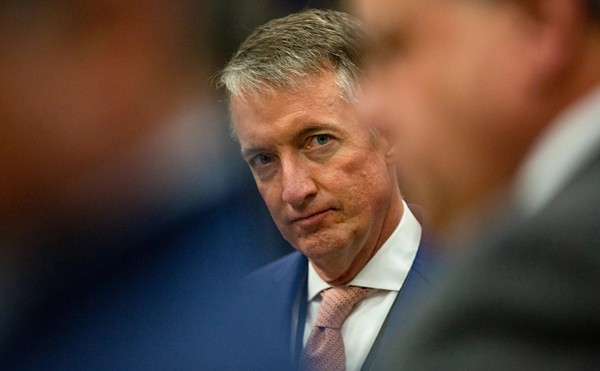On Sunday, June 8, the San Antonio Express-News published a story that seemed to vindicate former City Auditor Pete Gonzales’s contention that he was pushed out of his job because his drive to inspect local playgrounds would embarrass high-up City staffers. At a key April meeting attended by a full range of government big guns that sealed Gonzales’s fate, Parks and Rec Director Malcolm Matthews seemed to lay the issue to rest by asserting that the City thoroughly inspects its playgrounds annually — but in the end, his department could produce only audits from 2003 and 2008, the most recent one listing unsafe play areas that showed up on the 2003 reports. It’s not Mayor Hardberger’s favorite topic of the moment (he’s got a term-limit-repeal campaign to kick off June 19), but he took a few moments to argue the City’s defense to the Current.
I’m calling to talk to you about the playground story, which I’m sure you’ve had plenty of time to think and talk about over the past few days.
Well, the City has been pretty well dedicated to maiming and killing all the children that they possibly could.
I see. You thought you’d start with the playgrounds?
I thought, playgrounds are good. You catch ’em so unawares.
Speaking of being caught unawares, did you see this story coming?
No, I was not aware it was coming. Nobody ever called me, nobody ever talked to me on it. Nobody every tried to call me. And, frankly, I didn’t really see the story there even after I read the story. I mean, there may have been some little story there, but it wasn’t really World War III, above the fold, and occupying another page-and-a-half of text. I thought, when you boiled it down, what is the real story here? I mean, nobody’s getting hurt on these playgrounds; that’s usually where you get a story, that it’s dangerous conditions, hurting people, and you’re not doing anything about it. That’s a story; it just wasn’t this story, though.
Let’s break it down a little bit. It seemed to me there were two main components: One is that the City Manager’s office, the City Attorney’s office, and City Council were trying to limit the auditor’s ability to oversee the business of the city.
Well, the auditor was hired as a result of three councilpersons going to jail for financial shenanigans. So, that was put on the ballot that we needed someone as an auditor — it specified that it must be a CPA — to monitor and keep in line all of the finanical transactions of the City. Not only did he have to be a CPA, but his staff also had to be CPAs.
Clearly, this was an auditing in the general sense, and the word in his job duties in the charter is described three times in terms of “financial obligations.”
So, clearly, his job was in matters financial — not a job without substance as we’ve got a $2-billion budget. So that’s kind of important that you stay on the money trail here. It was also that position was to be independent of the City Manager so that the audit could criticize, if necessary, the City Manager without getting fired. And so it was the hiring of the auditor was on the part of the City Council. The City Council was the direct boss of the auditor, and, of course, the City Council could fire the auditor — so it was called an independent auditor, meaning independent of the whole rest of the city bureaucracy, only answering to the City Council. Pete had the rather unique idea that independent meant he had no boss.
So, this wasn’t the first time this tension had come up?
Oh, no, it had come up before and he really just didn’t get it about what his job was. It seemed simple enough to me; you know, CPAs audit our books all the time, it’s a phrase that we know and everybody’s corporations get audited, the Internal Revenue audits, everybody audits, and generally that’s done by CPAs. Well, he felt that unnecessarily limited him. That double-entry bookkeeping wasn’t that interesting to him; he had a much bigger canvas that he wanted to paint on. So there had kind of been continuing problems. And then he came up with one morning, as he said himself, when he was driving to work, he decided he wanted to audit the safety equipment of the playgrounds ... I don’t want to send a CPA out to figure out if these playgrounds are safe and what you should do about them if they’re not safe. It doesn’t make any sense. I’m not gonna ask you to fix the brakes in my car, either. But that’s what he wanted to do. There was an audit committee, they told him no, you stay with the books, and you work on the $2 billion dollars. We’ve got engineers — they’ll work on the playground equipment if there’s work needs to be done. So, really, that kind of became the subject — and I might say he was mighty lucky he picked that subject, because it’s emotional, you know. Nobody wants to see the children hurt or the city shirk their responsibilities.
I also thought the reporter seemed to be saying that once Malcolm said we do these audits every year, and Pete said, well, let me verify that they do those audits — which would be more of a paperwork job — since the committee could have said, all right, sure, that they ought to have said, OK, you can do that.
Well, in terms of to see if there had been an audit done — nothing wrong with that. It’s a little bit out of his range, but it’s fine; let him see if the audits have been done. But, really, he was saying more than that: He wasn’t just saying he wanted to see the audits, he wanted to see if these playgrounds were safe. And what needed to be done to make them safe, which really most anybody could have asked — anybody at all could have asked have their been inspections and let’s see the inspections. Clearly those are public records.
On Malcolm’s part, to be frank with you, I think there was some evidence that he kind of oversold his case, and at least gave the implication — I wasn’t in the room, I really wasn’t a part of any of these discussions — but the implication was, and maybe he said it, maybe it was more than an implication, was that they had been doing these annual audits for some time. That was not true; they had not been done for some time. They actually had been done the last year, all 114 of them, of which he and his inspectors had found 15 of ’em that showed deficiciencies that needed to be corrected. Ten of those had already been fixed, and they were kind working on some of the others ... and I thnk that would have been quite a satisfactory answer. It might not have been the greatest answer in the world, but it was true.
At this point, what do you think the repercussions are going to be for that?
Well, I think that would obviously have to be Sheryl Sculley’s choice, and I think Sheryl was also led to believe that there had been systematic inspections and it wasn’t just for the last year, it was for the last several years. And I don’t think she was very happy when she found out that that really isn’t true. Now, I do want to explain that it’s always been the case if people report — not only the public, but you have people out there working from the Parks and Recreation department — if they spotted anything that they didn’t think was safe, those have always been repaired, so it’s not like nobody had done anything ...
So the thing I didn’t like about the article — there was some points to be made in the article, which is except for the last year, you hadn’t done inspections. OK, fine. You should’ve done ’em. OK, fine. But the implication was that this was really hurting a lot of children and we knew it and we weren’t doing anything. That’s not true. The last time we heard of anyone really being hurt out there, which was a fairly minor injury, was 11 years ago. So in the last decade no significant injury’s ever occurred on any of these playgrounds, on these 114, so how dangerous was it?
Well, as someone who was an attorney and a judge, part of what they were saying is they’ve exposed the City to legal liability, because if someone were to get hurt and then they were to go back and look and say, this playground was flagged in 2003, and those repairs weren’t made, it shows negligence, for instance.
Well, if they had been flagged in 2003, they’d have been fixed. If somebody saw something out there, it would have been long since fixed.
Isn’t part of what they were saying is that there was an audit from 2003, and some of the same playgrounds that were noted as being problematic in 2003 were still problematic in 2008?
Elaine, I don’t believe that is true. But I don’t know that I can say 100-percent. I don’t believe that is the case, because I think the policy was to fix anyting that needed to be fixed. If there was something that needed to be fixed in 2003, and it didn’t get fixed until 2008, that’s not good. But I didn’t myself get that impression. The examples that were being used in the story were not examples that were dug out by an investigative reporter. Those were our own inspection reports, all those words: This needs to be fixed, that needs to be fixed, that’s dangerous. That was the City’s inspectors and that’s what City inspectors are supposed to do. So, while `the Express-News` were saying they don’t ever do any inspections, in fact they used the inspections that `the City` had done. That’s what we were looking at in the paper, the inspections that `the City` had done. So, I think our act could be cleaned up a little in that, but to say that it was a really dangerous situation out there? Nah, not really. If I told you that this Intersection A was a really, really dangerous intersection, what would be the first question that would come to mind? Well, how many wrecks have been out there in this dangerous, dangerous intersection? And if I told you, well, actually, there hadn’t been any for 10 years, I think most people’d say it doesn’t sound that dangerous. Maybe something should be done, but it doesn’t really sound really, really dangerous.


















